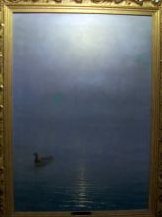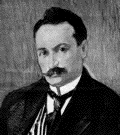Han-ı Yağma by Tevfik Fikret
November 22, 2007
FEAST OF PILLAGING
This small feast, gentlemen – for it is waiting to be devoured
trembling in your presence – it is the life of this people
Of this people agonized, of this people dying
But please, feel no restraint, eat, swallow, munch munch…
Eat ye gentlemen, this appetizing feast is yours
Till you are satisfied, nauseous, eat till you burst
Gentlemen, you are very hungry, it is to be seen from your faces
Eat, if you don’t eat today, perhaps it will not be here tomorrow
This heap of food is honored by your arrival
This is your right because of your campaign, yes, surely that right is yours
Eat ye gentlemen, this joyous feast is yours
Till you are satisfied, nauseous, eat till you burst
Count what these delicate gentlemen have lying around
Nobility, descendancy, honour, games, weddings, mansions, palaces
It is all yours, gentlemen, mansions, palaces, brides, parades
It is all your, it is all yours, readily, easily…
Eat ye gentlemen, this appetizing feast is yours
Till you are satisfied, nauseous, eat till you burst
Even if the digestion of greatness is a trouble, it’s no harm
It has the pride of grandeur, the joy of revenge
This feast expects kindness from your attention
They are all yours these heads, brains, livers, all these bloody morsels
Eat ye gentlemen, this sacrificing feast is yours
Till you are satisfied, nauseous, eat till you burst
The poor country will give, whatever it has, its possessions
Its body, its life, its hope, its dreams
Its entire well-being, what it has of joy in heart
Quick, devour it, don’t think about it being wrong or right
Eat ye gentlemen, this appetizing feast is yours
Till you are satisfied, nauseous, eat till you burst
This harvest will end, seize whatever you can on your way out
Tomorrow you might see all the crackling hearths go out
The stomachs of today are strong, the soup today is warm
Nibble, gobble fistfuls and platefuls
Eat ye gentlemen, this feast filled with music is yours
Till you are satisfied, nauseous, eat till you burst
HAN-I YAĞMA
Bu sofracık, efendiler – ki iltikaama muntazır
Huzurunuzda titriyor – şu milletin hayatıdır
Şu milletin ki mustarip, şu milletin ki muhtazır
Fakat sakın çekinmeyin, yiyin, yutun hapır hapır…
Yiyin efendiler yiyin, bu han-ı iştiha sizin
Doyunca, tıksırınca, çatlayıncaya kadar yiyin
Efendiler pek açsınız, bu çehrenizde bellidir
Yiyin, yemezseniz bugün, yarın kalır mı kim bilir
Şu nadi-i niam, bakın kudumunuzla müftehir
Bu hakkıdır gazanızın, evet, o hak da elde bir…
Yiyin efendiler yiyin, bu han-ı zi-safa sizin
Doyunca, tıksırınca, çatlayıncaya kadar yiyin
Bütün bu nazlı beylerin ne varsa ortalıkta say
Haseb, neseb, şeref, oyun, düğün, konak, saray
Bütün sizin, efendiler, konak, saray, gelin, alay
Bütün sizin, bütün sizin, hazır hazır, kolay kolay…
Yiyin efendiler yiyin, bu han-ı iştiha sizin
Doyunca, tıksırınca, çatlayıncaya kadar yiyin
Büyüklüğün biraz ağır da olsa hazmı yok zarar
Gurur-ı ihtişamı var, sürur-ı intikaamı var
Bu sofra iltifatınızdan işte ab ü tab umar
Sizin bu baş, beyin, ciğer, bütün şu kanlı lokmalar…
Yiyin efendiler yiyin, bu han-ı can-feza sizin
Doyunca, tıksırınca, çatlayıncaya kadar yiyin
Verir zavallı memleket, verir ne varsa, malini
Vücudunu, hayatını, ümidini, hayalini
Bütün ferağ-ı halini, olanca şevk-i balini
Hemen yutun düşünmeyin haramını, helalini…
Yiyin efendiler yiyin, bu han-ı iştiha sizin
Doyunca, tıksırınca, çatlayıncaya kadar yiyin
Bu harmanın gelir sonu, kapıştırın giderayak
Yarın bakarsınız söner bugün çıtırdayan ocak
Bugünkü mideler kavi, bugünkü çorbalar sıcak
Atıştırın, tıkıştırın, kapış kapış, çanak çanak…
Yiyin efendiler yiyin, bu han-ı pür-neva sizin
Doyunca, tıksırınca, çatlayıncaya kadar yiyin
Tevfik Fikret
I would like to acknowledge the author of this page here. I have used his Turkish explanations for some of the words and terms that I didn’t understand.
 Tevfik Fikret (1867 – 1915) was a brilliant poet. His real name was Mehmed Tevfik. He was influenced by Abdülhak Hamid Tarhan and in turn he influenced a whole batch of poets, including the equally brilliant Yahya Kemal. One of his most famous poems is Sis (the Mist), in which he describes Istanbul as a “slutty virgin widow”. This poem was forbidden during Sultan Abdülhamid II reign because of its politically critical character. However, many youth, among them Falih Rıfkı Atay, did secretly know the poem just for being rebellious, without really fully understanding it. One must not forget that Fikret and his school’s language is very complex and far from colloquial Turkish. It is this type of language that pushed the Turkish puritans like Yurdakul away from this group of poets and made Ömer Seyfettin remark: “Yes Tarhan is a true genious and Makber is a real masterpiece, too bad that nobody understands what he says”
Tevfik Fikret (1867 – 1915) was a brilliant poet. His real name was Mehmed Tevfik. He was influenced by Abdülhak Hamid Tarhan and in turn he influenced a whole batch of poets, including the equally brilliant Yahya Kemal. One of his most famous poems is Sis (the Mist), in which he describes Istanbul as a “slutty virgin widow”. This poem was forbidden during Sultan Abdülhamid II reign because of its politically critical character. However, many youth, among them Falih Rıfkı Atay, did secretly know the poem just for being rebellious, without really fully understanding it. One must not forget that Fikret and his school’s language is very complex and far from colloquial Turkish. It is this type of language that pushed the Turkish puritans like Yurdakul away from this group of poets and made Ömer Seyfettin remark: “Yes Tarhan is a true genious and Makber is a real masterpiece, too bad that nobody understands what he says”
The painting shown here was based on the poem Sis and it was painted by Abdulmecid, who would become the last of the Islamic Khalif’s. It look like a gray blotch, but if you look closely you can see the silhouette of Istanbul with its minarets in the mist.
 Han-i Yağma is literally translated “the table of pillaging”. Why did I translate it as “feast”? Because the “han” here means not just a table, but a table with food on it. For those of you who know a bit of Arabic, try and think about the difference between طاولة and مائدة. So perhaps there is a better word out there than “feast” but until I find that word, this is the best description. Aside from that I have to admit that the translation is not the best I ever did.
Han-i Yağma is literally translated “the table of pillaging”. Why did I translate it as “feast”? Because the “han” here means not just a table, but a table with food on it. For those of you who know a bit of Arabic, try and think about the difference between طاولة and مائدة. So perhaps there is a better word out there than “feast” but until I find that word, this is the best description. Aside from that I have to admit that the translation is not the best I ever did.
The poem itself is, much like Sis, a harsh critique on politics: rich men of the state devour everything of the people. The people on the other hand trust these men and are full of good will. I’m still trying to date the poem, which should give me a better idea on whom he is criticising, because I have read somewhere that this poem is aimed at the members of the Committee of Union and Progress (CUP), the guys who did the Young Turk revolution in 1908. If this is true it remains to be seen why Fikret would write so harshly about the men who did away with the Sultan who forbid his poems in the first place…
I think the poem is extra-cool because it is so descriptive and morbid. It should put every corrupt politician to shame. Because of this, it is also timeless.